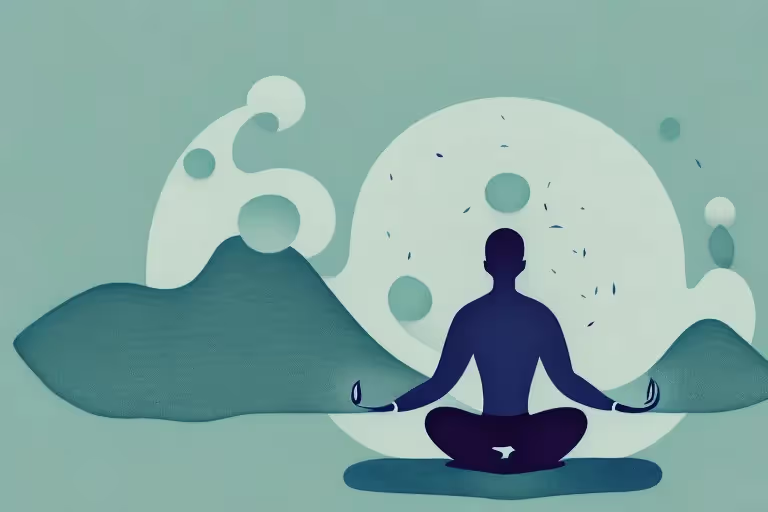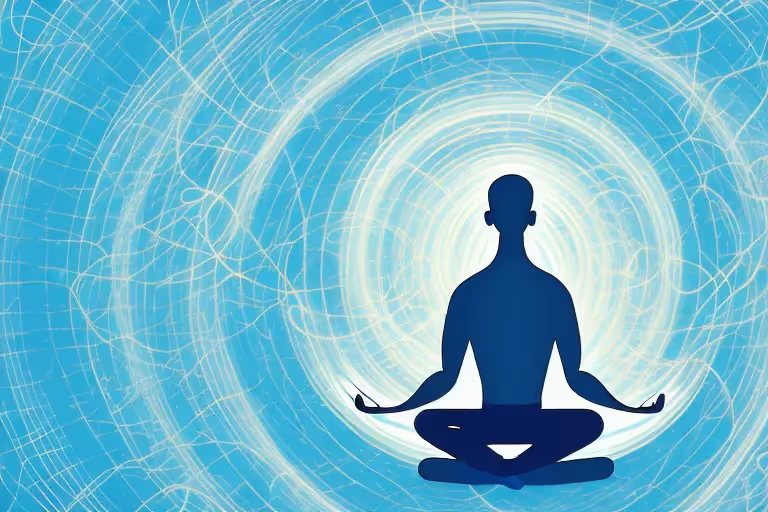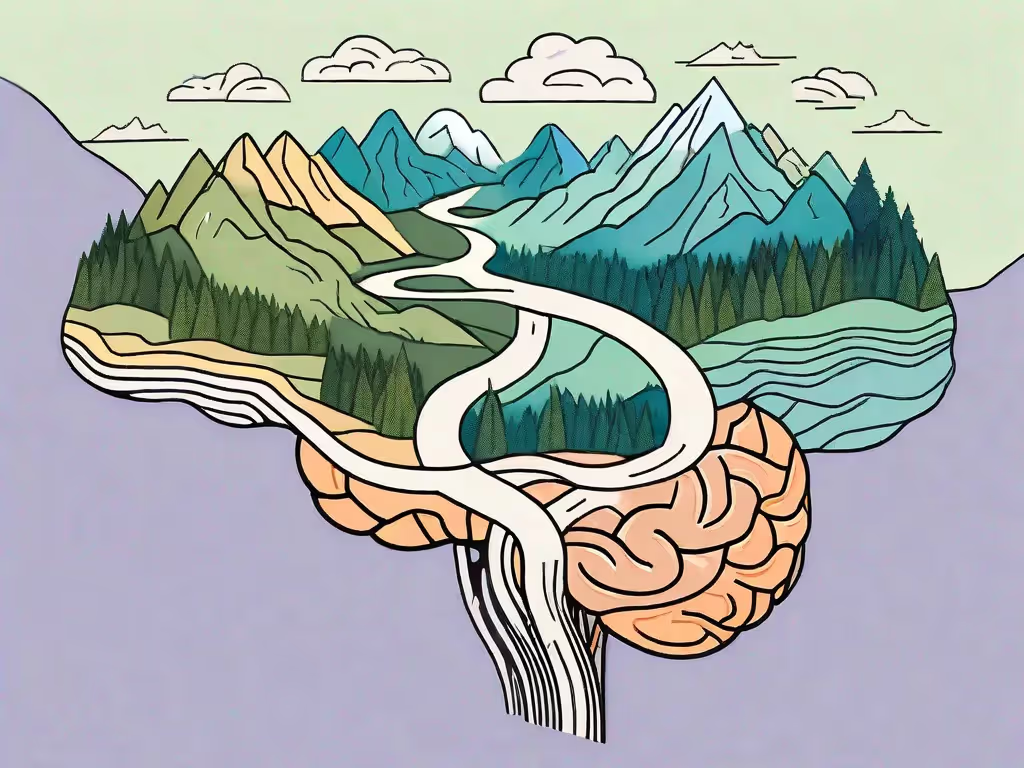In the vast world of meditation, one term that often surfaces is 'Mindfulness of Thoughts'. This concept, while seemingly simple, is a profound and transformative aspect of mindfulness meditation. It is the practice of becoming aware of our thoughts, observing them without judgment, and understanding their nature. It is a tool that helps us cultivate a sense of inner peace, clarity, and wisdom.
Developed by the meditation app Aura, this approach to mindfulness is designed to help individuals navigate their mental landscape with greater ease. It encourages us to step back from our thoughts, observe them as they are, and understand that they are not us, but simply transient mental phenomena. This article will delve into the depths of this concept, explaining its nuances, benefits, and how to practice it effectively.
Understanding Mindfulness of Thoughts
Mindfulness of Thoughts is a form of mindfulness meditation that focuses specifically on the thoughts that arise in our minds. It is about observing our thoughts, not from a place of judgment or analysis, but from a place of pure awareness. This practice allows us to see our thoughts as they truly are - transient, ever-changing, and not a definitive reflection of reality.
By cultivating this form of mindfulness, we learn to detach from our thoughts and see them as separate from our identity. This can lead to a profound shift in our perspective, helping us to navigate life with greater ease, clarity, and resilience.
The Concept of Non-Identification
At the heart of Mindfulness of Thoughts is the concept of non-identification. This is the understanding that our thoughts are not who we are. They are simply mental events that arise and pass away. By learning to observe our thoughts without identifying with them, we can experience a greater sense of inner peace and freedom.
Non-identification is not about suppressing or ignoring our thoughts. Instead, it's about acknowledging them, observing them, and letting them pass without getting caught up in them. This practice can be incredibly liberating, as it allows us to break free from the cycle of habitual thinking and reactive behavior.
The Role of Observation
Observation is a key aspect of Mindfulness of Thoughts. It involves paying close attention to our thoughts, noticing their content, their frequency, their patterns, and their effects on our emotions and behavior. This practice helps us to gain a deeper understanding of our mental processes and how they influence our experience of life.
Observation is not about analyzing or judging our thoughts. It's about watching them with a sense of curiosity and openness. By observing our thoughts in this way, we can begin to see them for what they truly are - transient mental events that come and go, rather than solid truths about ourselves or the world.
Benefits of Mindfulness of Thoughts
Practicing Mindfulness of Thoughts can bring about a wide range of benefits. It can help to reduce stress, improve mental clarity, enhance emotional intelligence, and foster a greater sense of well-being. It can also lead to a deeper understanding of ourselves and our mental processes, which can be incredibly empowering.
By observing our thoughts without judgment, we can begin to see patterns and habits that may be causing us distress or holding us back in life. This awareness can be the first step towards making positive changes and cultivating a healthier relationship with our minds.
Reduced Stress and Anxiety
One of the main benefits of Mindfulness of Thoughts is its ability to reduce stress and anxiety. By observing our thoughts without getting caught up in them, we can break the cycle of worry and rumination that often fuels these conditions. This can lead to a significant reduction in stress and anxiety, and an overall improvement in mental well-being.
Research has shown that mindfulness meditation, including Mindfulness of Thoughts, can be as effective as medication in treating anxiety disorders. It can also help to prevent relapses in individuals who have previously suffered from depression.
Improved Mental Clarity
Mindfulness of Thoughts can also lead to improved mental clarity. By observing our thoughts, we can begin to see through the fog of confusion and misunderstanding that often clouds our minds. This can lead to a clearer understanding of ourselves, our experiences, and our relationships.
This clarity can be incredibly empowering, as it allows us to make more informed decisions, respond to challenges with greater wisdom, and navigate life with a greater sense of purpose and direction.
Practicing Mindfulness of Thoughts
Practicing Mindfulness of Thoughts involves a few key steps. The first is to find a quiet and comfortable place where you can sit undisturbed for a period of time. The second is to bring your attention to your breath, using it as an anchor to keep you grounded in the present moment. The third is to begin observing your thoughts, watching them as they arise and pass away.

It's important to remember that this practice is not about trying to stop your thoughts or make them go away. It's about observing them with a sense of curiosity and openness, and learning to see them for what they truly are - transient mental events that come and go.
Observing Thoughts
The first step in practicing Mindfulness of Thoughts is to simply observe your thoughts. This involves paying close attention to whatever thoughts arise in your mind, without getting caught up in them or judging them. You might notice thoughts about the past, thoughts about the future, thoughts about yourself, thoughts about others, and so on.
As you observe your thoughts, try to do so with a sense of curiosity and openness. Don't try to push away unpleasant thoughts or cling to pleasant ones. Instead, simply watch them as they come and go, like clouds passing across the sky.
Noting Thoughts
Another useful technique in the practice of Mindfulness of Thoughts is noting. This involves mentally noting or labeling your thoughts as they arise. For example, you might note a thought as "thinking", "planning", "remembering", "worrying", "judging", and so on.
Noting can be a helpful way to create a bit of distance between you and your thoughts. It can also help you to see patterns in your thinking, which can be useful in understanding your mental habits and tendencies.
Common Challenges in Practicing Mindfulness of Thoughts
While practicing Mindfulness of Thoughts can be incredibly beneficial, it can also be challenging, especially for beginners. Some common challenges include getting caught up in thoughts, becoming frustrated or impatient, and experiencing unpleasant emotions or memories.
However, it's important to remember that these challenges are a normal part of the process. With patience, persistence, and a gentle approach, you can learn to navigate these challenges and cultivate a deeper sense of mindfulness and inner peace.
Getting Caught Up in Thoughts
One of the most common challenges in practicing Mindfulness of Thoughts is getting caught up in thoughts. This is when we become so absorbed in our thoughts that we lose touch with the present moment. It's like getting swept away in a river of thoughts, completely unaware of what's happening around us.
When this happens, it's important to gently bring your attention back to your breath, using it as an anchor to ground you in the present moment. With practice, you'll become better at catching yourself when you get caught up in thoughts and returning to the present moment.
Experiencing Unpleasant Emotions or Memories
Another challenge in practicing Mindfulness of Thoughts is dealing with unpleasant emotions or memories that may arise. This can be particularly challenging if you're dealing with issues like trauma, depression, or anxiety.
When unpleasant emotions or memories arise, it's important to treat yourself with kindness and compassion. Remember that it's okay to take a break from your practice if you need to, and seek support from a trusted friend, family member, or mental health professional if necessary.
Conclusion
Mindfulness of Thoughts is a powerful practice that can help us to cultivate a greater sense of awareness, clarity, and inner peace. By learning to observe our thoughts without judgment or identification, we can begin to see them for what they truly are - transient mental events that come and go. This can lead to a profound shift in our perspective, helping us to navigate life with greater ease and resilience.

While the practice can be challenging, especially for beginners, the benefits are well worth the effort. With patience, persistence, and a gentle approach, anyone can learn to cultivate Mindfulness of Thoughts and reap the many benefits it has to offer.



.webp)






.avif)

%20(1).avif)


.avif)
.avif)
.webp)


.avif)


















































































































.avif)

















.svg)









